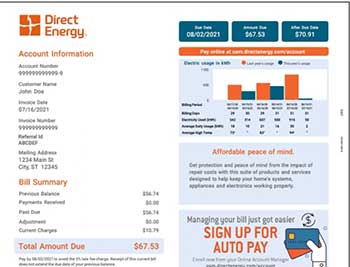When it comes to choosing an energy provider in Illinois, two major players stand out: Direct Energy and ComEd. But which one is the better option for you?
This comprehensive guide examines the key differences between Direct Energy and ComEd, including pricing, contract terms, renewable energy options, and more.
A Brief Comparison Table
| Features | Direct Energy | ComEd |
| Type of Company | Retail energy provider | Regulated electric utility |
| Service Territory | Throughout ComEd’s territory | Northern Illinois including Chicago |
| Market Structure | Competitive supplier | Government-regulated utility |
| Contract Terms | 6-36 month fixed rate plans with cancellation fees | No contracts, switch anytime |
| Pricing | Fixed (5.0-5.9¢/kWh) and variable (~5.0¢/kWh) plans | Default rate changes annually (currently 7.523¢/kWh) |
| Renewable Options | Match up to 100% of usage with renewable credits (~0.8¢ adder) | Green Region plan offers 100% local renewable energy (1.5¢ adder) |
| Billing | Separate supply and delivery bills | Single bill for full service |
| Customer Satisfaction | Scored 62/100 on J.D. Power survey | Scored 72/100 on J.D. Power survey |
Overview Of Direct Energy And ComEd

Direct Energy and ComEd both provide electricity and natural gas to customers in Illinois. However, there are some key differences:
- Type of company: Direct Energy is a retail energy provider that operates in competitive energy markets across the U.S. ComEd is an electric utility company regulated by the Illinois Commerce Commission.
- Service territory: ComEd serves northern Illinois including Chicago. Direct Energy provides service throughout ComEd’s territory.
- Customer base: ComEd has millions of customers across northern Illinois. Direct Energy serves over 300,000 residential and business customers in Illinois.
- Market structure: Illinois has a deregulated energy market, which allows customers to shop for competitive supplier prices from companies like Direct Energy. ComEd delivers energy as a utility.
Also Read: Choose Between National Grid And Eversource.
Direct Energy Illinois Plans And Pricing
Direct Energy offers both fixed rate and variable rate electricity plans in Illinois.
Fixed rate plans offer a locked-in rate for the entire contract term, typically 6-36 months. This protects against unpredictable rate hikes. Direct Energy’s fixed rate plans range from 5.0 to 5.9 cents per kWh.
Variable rate plans offer rates that fluctuate month-to-month based on the wholesale energy market. Current variable plans are around 5.0 cents per kWh. Variable rate plans come with no long-term contracts or cancellation fees.
Other charges like taxes, utility distribution fees, and infrastructure charges are still regulated by ComEd and will appear on your bill in addition to Direct Energy’s supply rate.
When comparing Direct Energy Vs. ComEd on price, Direct Energy often offers slightly lower rates than ComEd’s monthly default rate of around 7.5 cents per kWh. However, ComEd’s exact supply rate also fluctuates monthly.
ComEd Illinois Electricity Plans And Pricing

As an electric utility, ComEd offers only one standard rate plan determined by the Illinois Commerce Commission rather than competing for customers.
ComEd’s electricity price per kWh changes each June 1st based on forecasted supply prices. Outside of the annual rate update, ComEd’s price remains the same throughout the year.
The utility’s supply rate from June 2022 to May 2023 is 7.523 cents per kWh. This does not include taxes, fees, and other charges from ComEd.
ComEd residential customers also have the option to enroll in hourly pricing plans like Residential Real-Time Pricing to take advantage of lower prices during off-peak hours.
Direct Energy And ComEd: In-Depth Comparison Of Key Features
Contract Terms and Incentives
Direct Energy requires fixed-length contracts for its fixed rate plans. Contract terms range from 6 to 36 months. Cancellation fees apply if you end your contract early.
ComEd has no contracts since rates are set by the ICC. You can cancel or switch anytime with no penalties.
Both Direct Energy and ComEd offer sign-up incentives for new customers including cash back, airline miles, and smart home devices. Direct Energy occasionally offers larger incentives for longer contracts.
Renewable Energy Options
For eco-conscious consumers, renewable energy is an important consideration.
Direct Energy allows you to match up to 100% of your electricity usage with renewable energy credits from wind and solar sources. This costs around 0.8 cents more per kWh.
ComEd is required by Illinois law to source only 7.5% of its supply from renewables in 2022, increasing to 25% by 2025. ComEd Green Region lets you opt-in to 100% local wind and solar energy for 1.5 cents more per kWh.
So, if you want more clean energy than the ComEd standard supply, Direc Energy offers a competitively priced green power program.
Billing and Customer Service Experience
Direct Energy bills you directly for electricity supply and delivery each month. You pay ComEd separately for distribution and other utility charges. The dual billing can be inconvenient compared to ComEd’s single bill.
ComEd bills you directly for the full electric service, covering both supply and delivery. This single billing is simpler for customers.
For customer satisfaction, Direct Energy scored 62/100 on J.D. Power’s survey, while ComEd earned 72/100. Both providers offer online account management, but ComEd was rated higher for communication and problem resolution.
Also Read: Choose Between Direct Energy And Constellation.
Frequently Asked Questions (FAQ)
Direct Energy sells retail electricity and natural gas. They purchase energy on the competitive wholesale market and sell it to residential and business customers in deregulated markets. The energy itself is the same as what you would receive from your local utility company like ComEd.
Direct Energy is owned by NRG Energy, which is an independent retail energy provider based in Houston, Texas. NRG Energy acquired Direct Energy in 2018.
Direct Energy is owned by NRG Energy, which is a Fortune 500 company engaged in the retail sale of energy, generation of electricity, and community solar. NRG Energy purchased Direct Energy in 2018 for $3.6 billion in an effort to expand its retail energy business.
Also watch this video about Direct Energy!
Conclusion
When weighing Direct Energy against ComEd, the choice depends on your priorities:
- If you want lower electricity rates, Direct Energy fixed rate plans can beat ComEd’s standard price in many cases.
- For flexible terms, ComEd has no contracts and lets you switch anytime. Direct Energy locks you into 6-36 month fixed rate contracts.
- If you value simplicity, ComEd offers one bill covering your full electric service. With Direct Energy, you get separate supply and utility bills.
- For renewable energy, Direct Energy makes it easy to match your usage with wind and solar power credits.
- For customer satisfaction, ComEd scores higher in service quality surveys than Direct Energy.
As the competitive supplier, Direct Energy may offer cheaper rates. But ComEd provides a simpler experience as the incumbent utility. Evaluate your priorities to decide if savings from Direct Energy are worth the tradeoffs.

